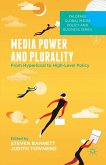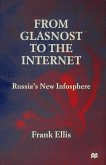'With increasing interconnectness of communication systems and more media enterprises operating worldwide, global media policies are more salient but are often unfamiliar or misunderstood. Although developing since the early days of telephony and broadcasting, their significance has increased since developments such as satellite communications and the Internet have thrust communications debates from the nation state to international level. This book positions global policy issues and debates within a wide framework of national and international issues, conflicting interests, and differing approaches to communication challenges. It is an important step forward in understanding global policy makers, processes, and outcomes.' - Professor Robert G. Picard, Reuters Institute, University of Oxford, UK 'Global Media and Communication Policy is a major contribution to an emergent research field, capturing the detail of policy and institutional arrangements that are emerging at levels beyond the nation-state, while also critically reflecting on the wider implications of such changes for the frames we use to understanding the media and its wider social, cultural, political and economic roles.' - Professor Terry Flew, Queensland University of Technology, Australia 'Global Media and Communication Policy provides a valuable extension beyond previous work through its emphasis on the increasing globalization of media policymaking, as well as through the depth and rigor with which it examines the policy implications of the ongoing process of technological convergence. Scholars, students, and policymakers alike will benefit from the book's strong theoretical grounding and its very thorough incorporation of the relevant literature. Whether you're new to the media policy field or have been working in these particular trenches for years, this book will be a valuable resource.' - Philip M. Napoli, Fordham University, USA 'Global media policy is a young and dynamic field whose boundaries are just being defined. This book is a substantial contribution to this exercise. It covers the literature exhaustively and highlights the key issues and debates. It illustrates the tension between the different actors and institutional levels (local, national, regional, international) and takes a critical, yet measured approach to the subject. Possibly most important, it brings us a bit closer to being able to answer the question: what is global media policy?' - Marc Raboy, McGill University, Canada '...this is an important contribution to the field that raises new lines of enquiry for future research. More profoundly, for all those citizens interested in the scismic shifts that are affecting the global media economy and its policy communities Iosifidis's monograph will be rewarding reading.' - International Journal of Digital Television 'This monograph undoubtedly makes a significant contribution to an emergent field in communication studies...graduate students in particular may derive full benefit from the scope and depth of the author's analysis.' -Raymond Kuhn, Queen Mary University of London, Journalism 'This book is a timely look at the outside approach that policymakers are taking to the proverbial 'box' as they approach new challenges beyond the traditional media landscape.' LSE Review of Books
Bitte wählen Sie Ihr Anliegen aus.
Rechnungen
Retourenschein anfordern
Bestellstatus
Storno








